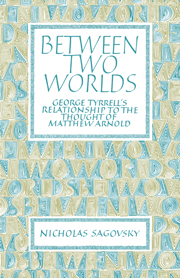Book contents
- Frontmatter
- Contents
- Acknowledgments
- Abbreviations and note on references
- 1 Tyrrell and Arnold ‘between two worlds’
- 2 The history of an opinion
- 3 ‘Definite evidence’
- 4 Fundamental convergence: epistemology and metaphysics
- 5 The life of the spirit: ecclesiology and culture
- 6 Christology: the parting of the ways
- 7 God, and ‘the Power that makes for Righteousness’
- 8 Conclusions
- Appendix Two letters to the Abbé Venard
- Notes
- Select bibliography
- Index
7 - God, and ‘the Power that makes for Righteousness’
Published online by Cambridge University Press: 23 October 2009
- Frontmatter
- Contents
- Acknowledgments
- Abbreviations and note on references
- 1 Tyrrell and Arnold ‘between two worlds’
- 2 The history of an opinion
- 3 ‘Definite evidence’
- 4 Fundamental convergence: epistemology and metaphysics
- 5 The life of the spirit: ecclesiology and culture
- 6 Christology: the parting of the ways
- 7 God, and ‘the Power that makes for Righteousness’
- 8 Conclusions
- Appendix Two letters to the Abbé Venard
- Notes
- Select bibliography
- Index
Summary
For both Tyrrell and Arnold the question of God was central. Moreover, they often expressed themselves in similar terms. We have seen in chapter 3 that Arnold gave Tyrrell a phrase for God: ‘the Power that makes for Righteousness’. In that earlier discussion (pp. 33–5) it was clear that Tyrrell played on or alluded to the phrase from 1899 on, that it reappears in a number of his most important books, and is specifically debated with Hakluyt Egerton (Arthur Boutwood) in 1908–9. In a preliminary way, we saw that for Tyrrell the phrase always carried connotations of personal being, because ‘the Power that makes for Righteousness’ was for him a phrase describing the human experience of a personal God. Egerton argued that Tyrrell could not logically move from the experience of such a Power to the assertion that the Power was personal. Tyrrell took issue, with what success we shall see.
Arnold, in his use of the phrase, blocked off the question of the personal nature of God. What we experience is no more (and no less) than a ‘power, not ourselves, that makes for righteousness’. Tyrrell tended to omit ‘not ourselves’, whereas for Arnold the phrase was incomplete without those words. Surprisingly, then, it is Arnold who has the more secure hold on the transcendence of God – the ‘power’ is ‘a power, not ourselves’ – whilst Tyrrell has by far the stronger hold on the personal nature of God.
- Type
- Chapter
- Information
- Between Two WorldsGeorge Tyrrell's Relationship to the Thought of Matthew Arnold, pp. 116 - 139Publisher: Cambridge University PressPrint publication year: 1983

